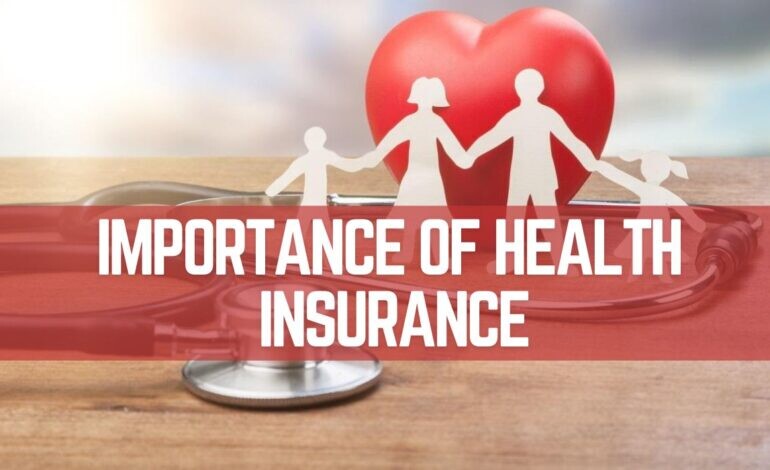You undoubtedly constantly hear individuals discussing health insurance. However, you can feel that you don't really comprehend it. That's okay because the issue can actually be somewhat perplexing.
But just like other things, you can quickly understand the fundamentals of health insurance. And Health Insurance 101 will assist you in achieving that.
Therefore, let's examine a few issues together. How does health insurance operate and what is it? Do you need health insurance, too?
Table of contents [Show]
What Is Health Insurance?


In short, health insurance serves as a means of covering your medical expenses. Most people cannot afford to pay for all of their medical expenses out of pocket; instead, they must use a debit or credit card.
Health insurance can help you get the care you require and make it easier for you to pay for your medical expenses.
Different Kinds of Health Insurance: Private and Government-run


Health insurance policies come in various varieties. Government officials oversee some programmes. For instance, you've probably heard of the government-run programmes Medicare and Medicaid:
- Medicare is health insurance available to those over the age of 65 as well as some disabled individuals under the age of 65.
- Medicaid provides low-income individuals with health insurance.
Private health insurance coverage are also available. Employers frequently provide private health insurance to their employees, and self-employed persons frequently buy private health insurance as well. With commercial health insurance plans, you normally pay the health insurer a monthly premium; frequently, there is no monthly cost with government-run health insurance.
How Health Insurance Works


When you have health insurance, your health insurance plan is the first place your medical bills are paid. Then, in accordance with the specifics of the plan, they pay all or part of that bill.
Health insurance resembles auto insurance in certain ways. Automobile insurance covers a portion or all of the cost if your car is in a serious accident and requires extensive repairs or perhaps needs to be completely replaced with a new vehicle. The cost of repairing or replacing your car could easily exceed the amount you have in your bank account, so that's a good thing.
However, health insurance, unlike auto insurance, pays for much more than just the costs of an unfortunate accident. Annual physicals, immunizations, preventative care, and other types of "regular maintenance" for your body and mind are frequently covered by health insurance. It would be similar to auto insurance paying for tyre rotations and oil changes.
There are primarily two benefits of having health insurance:
- Having health insurance helps you if you become ill.
- Having health insurance helps you stay healthy in the first place.
Let's examine each of these explanations in greater detail:
Health Insurance as a Safety Net


As a safety net, health insurance is crucial. Health insurance is available to help cover expenditures that you probably can't afford to pay on your own if you become ill or injured unexpectedly.
The cost of medical care can be very high. It could be a huge financial strain. Costs for procedures including surgery, urgent care, prescription medications, lab work, scans, and exams can quickly pile up. They may even be excessive enough to force people into bankruptcy or to refuse treatment that they require but cannot afford out of pocket.
But with health insurance, you don't have to deal with such expenses on your own because you have a plan that will help you pay for them and sort through the confusing world of medical billing.
Let's face it: paying medical bills when you're sick, hurt, in a hospital bed, or in the ER is the last thing you need. It's a good idea to purchase health insurance before becoming ill so that you can make difficult financial decisions in advance.
Preventing Illness
The other reason it’s important to have health insurance is that it makes it easier for you to keep from getting sick in the first place.
Having health insurance makes it easier for you to access – that is, find and pay for – routine and preventive health care. This includes:
- Annual checkups
- Vaccinations (flu shots, MMR, etc.)
- Blood tests and lab work
- Scans and screenings
These all play a role in keeping you healthy, and diagnosing any illness you might have as soon as possible.
Additionally, health insurance assists in defraying the costs of treating any ongoing illnesses you might have, like diabetes, heart disease, and depression. For these kinds of illnesses, health insurers often offer disease management plans. They can also direct you to experts and other helpful resources. That makes it simpler for you to be organised and in good health.
When it comes to kids, routine and preventive treatment is extremely crucial. To be healthy and thrive, children, babies, and expectant moms all need regular medical attention. Early intervention can possibly save lives by preventing future issues.
Health insurance often covers mental and behavioural health care as well, so it's not only about physical health.
Can I Afford Health Insurance?


Most private health insurance plans need you to pay a monthly fee in order to enrol. It is much more likely that you can afford health insurance than it is that you can afford to pay out of cash for a procedure, an illness, or a trip to the emergency room.
In order to cater to a wide range of income levels, private health insurers typically provide a number of plans at various premium amounts.
You might qualify for a government health insurance programme like Medicaid or Medicare if you cannot afford a private health insurance plan. Alternatively, you may qualify for financial assistance through the healthcare.gov website. Healthcare Insurance Exchange
Cost-sharing
However, not everything is covered by health insurance. The majority of insurance policies also include various forms of cost-sharing in addition to paying your monthly premium. Below, we'll go through each one and describe how it operates.
The first is the deductible, which is the sum of medical expenses you are responsible for paying before your insurance plan begins to cover some of those expenses. You must therefore pay the first $1,000 in medical expenses if your plan's deductible is $1,000 in order for your health insurance to start paying its half of the bill.
When you visit a doctor, insurance plans frequently require that you pay a copay. Another option is a coinsurance arrangement, in which you pay 20% of the cost of particular medical expenses and the insurance company pays the remaining 80%. Copays and coinsurance normally kick in once your deductible has been met, though occasionally they do so even before then.
The out-of-pocket maximum comes last (or maximum out-of-pocket). Once you've spent that much on medical expenses in any given year, your health insurance plan will cover all of your subsequent medical expenses in full. You only have to pay your monthly fee.
Here’s an example of how it works with numbers plugged in. We’ll call it the “Ten Plan”, and keep the number simple.
Ten Plan (example)
- $10 Copay (after deductible met)
- 10% Coinsurance (after deductible met)
- $1,000 Deductible
- $10,000 Out-of-pocket maximum
In the Ten Plan, you must pay the first $1,000 of your medical expenses out of pocket in addition to your monthly premium (i.e., your deductible). That covers everything, including doctor appointments, lab work, x-rays, surgery, and physical therapy. However, after that, you'll only be responsible for $10 each doctor visit and 10% of all additional medical expenses.
And if you end up shelling out a total of $10,000 in a given year, the balance of the year's expenses are covered by your health insurance plan. You only have to pay your monthly fee.
What If I Don’t Get Sick? Don’t I Lose Money?


You might be thinking, "Won't I lose money if I sign up for health insurance, pay my monthly premium, but don't get sick and use any medical care?"
But that's not quite correct.
First, many health insurance benefits, such as immunizations and checkups that help you stay healthy in the long run, can be utilised even if you don't get sick.
Second, you get the peace of mind in knowing that, if you got sick, you wouldn't have to pay all those medical expenses on your own, even if you don't get into an accident, have high medical expenses, or need to use your health insurance benefits.
Last but not least, even if you don't use your own health insurance benefits, your premiums help to cover the costs of other people on your plan's benefits and medical care. And one day, when you do fall ill and require assistance with paying your medical bills, the other members of your plan will do the same for you.









